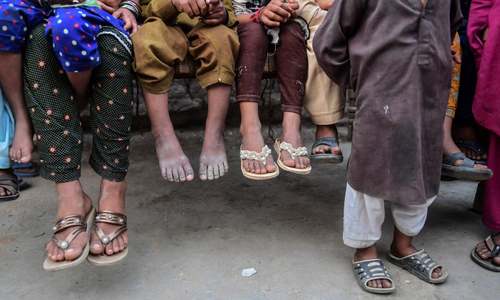KARACHI: Describing the number of blood-borne and sexually transmitted diseases in the officially released provincial data as ‘gravely underestimated’, experts on Friday called upon the government to improve blood screening services both in the private and public sector and provide them at highly subsidised rates to the masses.
They were speaking to Dawn with reference to the data released by the Sindh Blood Transfusion Authority (SBTA) that showed that 24,088 individuals were infected with one or more infectious diseases and were unfit for blood donation after their samples were screened at the blood banks in 24 districts during the first eight months of 2021.
A total of 455,742 samples were tested in the province.
The HIV infection, according to the figures, was detected in 1,357 people whereas 8,155 intended donors were found hepatitis B positive. A total of 7,995 people were infected with hepatitis C.
In addition to that, as many as 6,142 intended blood donors were found to be infected with syphilis, a sexually transmitted infection. A total of 448 intended blood donors were found infected with malaria.
Experts ask govt to improve blood screening services and subsidise charges for people
In Karachi, the data say, with 653 patients district East tops the list of HIV-infected people followed by district South (431), district Malir (78), district Korangi (77), district Central (23) and district West (20).
Similarly, district South had the highest number of hepatitis B (2,603) and hepatitis C (2,923) infections among intended blood donors followed by district East (1,085 hepatitis C cases and 1,261 hepatitis B cases) and district Central (483 Hepatitis C cases and 1,254 hepatitis B cases).
The highest number of syphilis cases (1,625) among intended blood donors was found in district South followed by district East (926), district Central (522), district Korangi (206), district Malir (112) and district West (83).
‘Grossly underestimated data’
“This data is grossly underestimated mainly due to the fact that most blood banks and healthcare facilities in Pakistan lacked the facility of nucleic acid test (NAT) that has 99 per cent accuracy. The SBTA didn’t carry out the screening, rather collected these figures from blood banks,” said Prof Rafiq Khanani, a senior pathologist and president of the Infection Control Society of Pakistan.
Generally, he pointed out, blood screening facilities were either using Indirect Coombs Test that had 5pc chance of false negative or Elisa test that had 2pc likelihood of false negative. The NAT, however, had a 0.5pc chance of false negative. But, the procedure was a bit costly.
“Having said that, these figures are still staggering as identified cases involved people who had no idea that they were infected and opted for screening only because they wanted to donate their blood.
“They are not aware that they have a serious infection such as hepatitis B, C or HIV either because they are asymptomatic right now or have mild disease symptoms. They might be spreading the disease to their loved ones, especially wives or partners who should also get tested,” he said, adding that the modes of transmission of hepatitis B, hepatitis and HIV were the same and that these diseases also carried the risk of mother-to-child transmission.
According to Prof Khanani, the government must encourage volunteer blood donation and people should get themselves tested for these major infectious diseases at least once in their lifetime.
“There are so many health benefits of blood donation that young people should know. It’s important because then they would get tested for all major diseases in a convenient manner and not in haste,” he said, adding that early diagnoses could save many lives.
Dr Abdul Ghafoor Shoro of the Pakistan Medical Association (PMA) urged the government to strengthen primary healthcare and make blood screening highly subsidised.
“At our outpatient services at a PMA Hospital in Karachi, we examine 60 patients of hepatitis B and C weekly. People are so upset over growing inflation that they won’t spend their hard-earned money on volunteer screening. It’s the state responsibility to provide them with basic quality health services,” he said.
Published in Dawn, October 9th, 2021













































